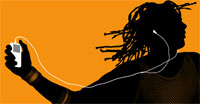 More and more people are using computers or portable players for music, even though traditional radio still leads the competition, according to a recent market study.
More and more people are using computers or portable players for music, even though traditional radio still leads the competition, according to a recent market study.
The report from market researcher, The NPD Group, revealed that approximately 77.2 million customers grooved to music stored on a computer during March 2005 – up 22 percent from the 63.2 million recorded during the same month last year.
Online radio stations also enjoyed an upturn in popularity, with 53.5 million listeners tuning in this March, up from 45.3 million a year ago.
Free streaming of music also saw notable gains, with a rise of 37 percent, to 46 million listeners.
Traditional radio continues to be the preferred medium, but listening audiences shrank 4 per cent to 194 million, down from 203 million a year earlier.
“The rise of digital listening and storage for music continues unabated this year,” Russ Crupnick, president of the Music and Movies division at NPD, said in a statement. “Technology companies are providing new tools to consumers in the form of powerful music-enabled PCs and portable music players; music companies are answering the call for more content; and consumers are responding positively.”
There’s a right royal barney going on in the online music business, with several big names fighting it out for a fat slice of the lucrative download market, currently dominated by Apple’s iTunes store and iPod music players.
 Last week, Yahoo revealed their determination to become big noise in the music industry, unveiling a music subscription service that significantly undercuts their rivals.
Last week, Yahoo revealed their determination to become big noise in the music industry, unveiling a music subscription service that significantly undercuts their rivals.
According to the NPD survey, the number of consumers ripping music onto their computers has more than doubled since March 2004, with a substantial (127 percent) increase in music transferred to MP3 players since last year.
With a 93 percent increase in paid music downloads during the same period registered, online music is becoming increasingly accepted.